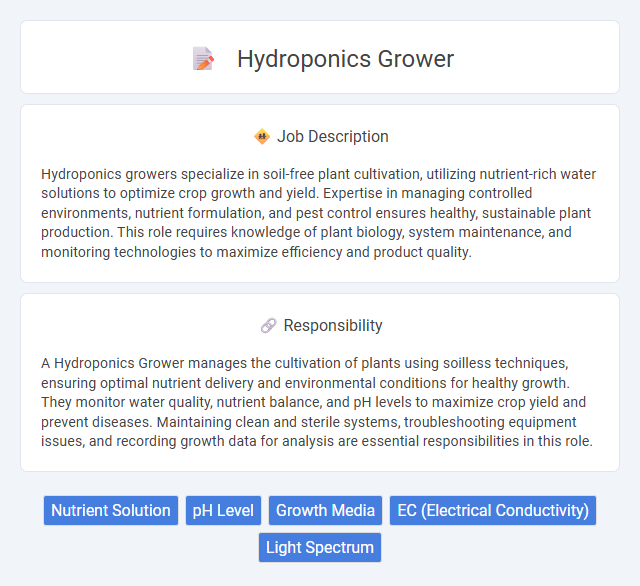
Hydroponics growers specialize in soil-free plant cultivation, utilizing nutrient-rich water solutions to optimize crop growth and yield. Expertise in managing controlled environments, nutrient formulation, and pest control ensures healthy, sustainable plant production. This role requires knowledge of plant biology, system maintenance, and monitoring technologies to maximize efficiency and product quality.
Individuals with a strong interest in sustainable agriculture and a willingness to work in controlled environments are likely to be well-suited for a hydroponics grower job. Those comfortable with technical equipment and detail-oriented tasks may find the role particularly fitting. Conversely, people who prefer outdoor work or have difficulty adapting to repetitive procedures might face challenges in this position.
Qualification
Hydroponics growers require expertise in plant biology, nutrient management, and environmental control systems to optimize soil-less cultivation. Proficiency in monitoring pH levels, electrical conductivity, and water quality is essential for maximizing crop yield and health. Hands-on experience with hydroponic equipment, combined with knowledge of Integrated Pest Management (IPM) and crop rotation techniques, enhances overall production efficiency.
Responsibility
A Hydroponics Grower manages the cultivation of plants using soilless techniques, ensuring optimal nutrient delivery and environmental conditions for healthy growth. They monitor water quality, nutrient balance, and pH levels to maximize crop yield and prevent diseases. Maintaining clean and sterile systems, troubleshooting equipment issues, and recording growth data for analysis are essential responsibilities in this role.
Benefit
Hydroponics growers likely experience benefits such as increased crop yield due to controlled nutrient delivery and environmental conditions. They may also benefit from reduced water usage and fewer pest-related issues compared to traditional soil farming. This job probably offers opportunities to work with innovative agricultural technologies and sustainable food production methods.
Challenge
Challenges in a Hydroponics Grower job likely involve maintaining optimal nutrient levels and environmental conditions to ensure plant health and productivity. Managing pest control without soil presents unique difficulties that require innovative solutions and constant monitoring. Balancing resource efficiency with crop yield may also pose ongoing operational hurdles.
Career Advancement
Hydroponics grower roles offer significant career advancement opportunities through expertise in controlled environment agriculture, nutrient management, and plant physiology. Professionals can progress to senior agronomist, greenhouse manager, or research and development specialist positions by gaining certifications and hands-on experience with innovative hydroponic systems. Mastery of advanced technologies like automated climate control, water recycling, and crop yield optimization enhances prospects in sustainable agriculture and agritech industries.
Key Terms
Nutrient Solution
A Hydroponics Grower expertly formulates and manages nutrient solutions to optimize plant growth in soil-less environments. Precise control of pH levels, electrical conductivity (EC), and nutrient concentration ensures plants receive essential minerals like nitrogen, phosphorus, and potassium. Continuous monitoring and adjustments of the nutrient solution promote healthy root development, higher yield, and disease resistance in hydroponic crops.
pH Level
Hydroponics growers meticulously monitor and adjust the pH level of nutrient solutions to optimize plant nutrient uptake and growth. Maintaining a pH range of 5.5 to 6.5 is essential for maximizing nutrient availability and preventing deficiencies or toxicities. Accurate pH control enhances yield quality and supports healthy root development in hydroponic systems.
Growth Media
Hydroponics growers specialize in cultivating plants using soilless growth media such as coconut coir, perlite, and rockwool, which provide optimal aeration and nutrient absorption. They monitor and adjust pH levels, moisture content, and nutrient delivery systems to maximize plant growth and yield. Expertise in selecting and maintaining the ideal growth medium ensures efficient root development and disease prevention in hydroponic systems.
EC (Electrical Conductivity)
Hydroponics growers closely monitor Electrical Conductivity (EC) levels to ensure optimal nutrient availability in the growing solution, directly influencing plant health and yield. Maintaining EC within precise ranges, typically between 1.2 to 2.0 mS/cm depending on crop type, prevents nutrient imbalances and root damage. Advanced hydroponic systems utilize EC sensors and automated dosing to dynamically adjust nutrient concentrations, maximizing growth efficiency and crop quality.
Light Spectrum
Hydroponics growers optimize plant growth by carefully managing the light spectrum, balancing blue and red wavelengths to promote photosynthesis and vegetative development. Targeted use of specific spectrums enhances crop yield, quality, and energy efficiency in controlled environments. Advanced LED technology enables precise adjustments in light intensity and spectrum, crucial for maximizing plant health and growth rates.
 kuljobs.com
kuljobs.com